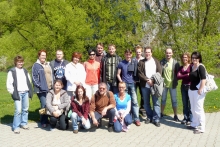From doubt to dedication: Young Czech and Slovakian trade unionists get active

The seminars organised within the project mixed basic theory with action-learning. The seminar topics included the recruitment and motivations of young workers, labour laws, union organising, collective bargaining and participation.
Before 1989, trade unions in were simply controlled by the state, and were held in low regard by most of the population. Despite the emergence of independent and democratic trade unions in the Czech Republic and Slovakia after the fall of the Berlin Wall, unions continue to suffer from a degree of public mistrust, being associated with the period prior to 1989. The result, for many unions, has been a small base with an aging membership.
If the unions are to remain legitimate representatives of workers, large numbers of young workers in the public sector need to be organised. From this challenge, the project was born but the organisers were unsure how the young members would respond.
“It was the first time we’ve focused on youth. So for me, our biggest success was that participants, from local workplace committees in both countries were actually prepared to give up their free time on weekends to come and they participated enthusiastically again and again. As well as health workers, participants included fire fighters, civilian army workers, central government and local government workers and water and gas workers.” Reported Josef Krejbych, PSI Sub-regional Secretary for Central Europe.
Contributing success factors included the backing of OS ZSP’s President who was in charge of organising the activities and the involvement of Denis Rohan, IMPACT Assistant General Secretary, who took part in the seminars. His commitment internationalised the sharing of knowledge and experience and helped boost confidence.
Another attraction was how seminars enabled the members to think in new ways, applying the techniques alone, in small groups and in plenaries. They learnt to identify and find solutions to long standing or urgent challenges and at the end of each weekend, they took back to their local unions a well thought through practical idea and tailor made materials.
Back in their workplaces, through trial and error, the young members tested their new found knowledge on their normally passive and disinterested work colleagues. Their persistence paid off because everyone was able to report some kind of success. For example, an ‘open door day’ where workers could learn about their union committees work brought about increased interest in activities; a membership questionnaire assisted participants to better understand their work colleagues’ interests and concerns; and in OS ZSP, a three month ‘recruit a member’ campaign brought in several hundred new members.
Additionally, many participants set up local workplace youth committees and some seminar participants managed to get elected to their national union committee. For example, in OS ZSP, two young members were elected as Chairpersons and one became a member of the audit board. Capturing the spirit of the project’s success and PSI’s hopes for the future Josef declared:
“At the last seminar, I remember we celebrated one colleague who is a hospital worker in the North of Czechland. It was really good because he had succeeded in forming a new workplace trade union committee and a youth committee in his workplace.”
For a complete survey of IMPACT/PSI trade union development cooperation between 2008 and 2013 click here: In the People's Interest
Map: IMPACT/PSI project collaboration between 2008 and 2013

